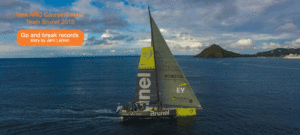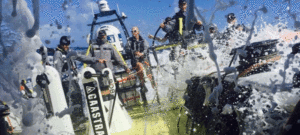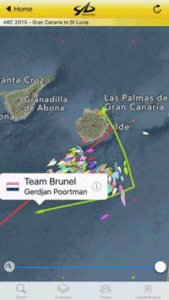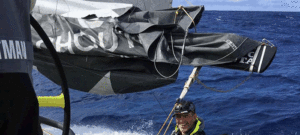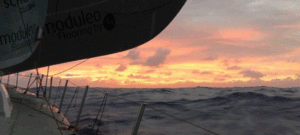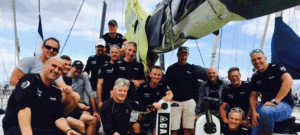GO AND BREAK RECORDS!
8 days, 7 hours, 39 minutes and 30 seconds!
In crossing the Atlantic, I learned a few things that I would like to share with you. First of all, I can tell you that the ocean is really big, with plenty of space for everyone. If you believe that the world is overpopulated and you want to be alone for a while, the ocean is a good place to go. In eight days, we only saw five other ships or sailboats and only for 5-10 minutes at a time. We saw a few dolphins and were attacked by a lot of flying fish. And yes, being slapped by a flying fish is an unpleasant surprise.
Being together with 14 other guys was actually easier than you would expect. They are really great guys, and the long discussions about life and other business during our recovery time were really great.
Is it tough?
Yes. First of all, you are wet all the time. No shower, no towels. You have to hold on constantly, as the boat is trying to shake you off. Down below, in the black hole, you try to prepare food while speeding along at 18-25 knots on what feels like a really bumpy road. When the boat hits a big wave, the boat decelerates to 15 knots in two seconds, resulting in a few bruised ribs and lots of bruises. Your kidneys are being massaged when you are in your bunk, requiring frequent trips to the bottle (there really is no proper toilet). Finally, if you have a small scratch, the salt water will actually eat your skin. But it’s fun.
Did we go fast?
All in all, there were around 200 boats in the race, but only 14 others in our racing class. There was also a fleet of catamarans that started before us. When we deployed our fractional spinnaker in a 25 knot breeze, we were brutally lifted out of the water, marking the start of an eight-day surf and leaving the rest of the fleet in our wake. We passed the last catamaran after 30 minutes, and after 45 minutes we couldn’t see any other boats. We sailed about 100 miles south of the Canaries to avoid the wind shadow from the islands. Some would say that a bit of shadow is good in a 30 knot breeze, but not on a Volvo 65. We like the breeze and raced ahead while the rest were docked.
Living your life four hours at a time. We were divided into four teams and I was teamed with Jens Dolmer (two-time Volvo Ocean Race participant), Gerdjan (three-time participant), and Robertjan. We were clearly the best team! I learned so much on this trip. All the credit goes to the pro sailors, without whom we would not have survived. You work for four hours in a row, and I started at 4 a.m. until 8 a.m. You have to work hard for those four hours. Steering the boat is very stressful. I only wiped out once, which involves a lot of noise, the bow turning up to the wind at 23 knots, everyone wakes up, the boat heels 40-50 degrees, and then you really have to hold on. If you are not steering you are holding a piece of rope that cuts through the skin on your hands and have to pull or release every minute. Otherwise, you are the guy who powers the winches. And yes, the main sail is tough to pull in and once it is in, the guy controlling the mainsheet releases it again; it never ends. It is very good exercise though, and I lost 5 kg during the trip. After a four hour shift, you need food and sleep because four hours later, you have to be ready again.
Were there any surprises?
Yes: three days before the finish line, on a pitch black night, we performed a jibe (bringing the boom from one side to the other), a tough and complicated operation that requires hard work by ten crewmembers. We are not sure what caused the 10 x 10 m hole in the main sail, but a large truck could have easily passed through. Maybe it was a giant flying fish; maybe the sails just decided to quit after 50.000 miles of ocean sailing. We don’t know what caused it, but we certainly did not make any mistakes…
We thought it was game over, but we reefed the sail and continued with 80% efficiency. The record attempt was a dead idea, as we needed 85% efficiency. The next morning, the skipper had the idea to tie the two remaining pieces together to make a new, short, catchier logo for Brunel. Brunel was now “Bnel”, but it was still way better than just “nel”. Our efficiency was now above 85%, taking us from game over back to game on. At the same time, we decided to deploy our Masthead Zero, which is a really big sail. Not the best combination for controlling the boat, nor very safe for the mast, but it is fast and we were in need of speed.
By now, the mood was up and wind was picking up, looking even better.
The second surprise was the next pitch black night. We lost all power on the boat, leaving us blind with no instruments, no compass light and still travelling at 20 knots. The last time I tried this on a Volvo 70, I broke my hand, shoulder, ribs and tore a muscle. Luckily, it happened on our shift with a pro at the wheel and me reading the compass heading with a small battery powered light. The instruments never fully recovered, but came close enough after an hour. Incidentally, why does B&G start a reboot of the instruments by flashing the screens, leaving the crew blind for a few seconds?
Is it beautiful?
Yes, the stars, the moon and the clouds are not just objects you observe, but tools to get you where you want if they allow it. You are very small out there and you will only survive if you are humble. It was my first sighting of a lunar rainbow.
Three days after our arrival, I feel recovered and the red spots on my body are almost gone; yes, that is another side effect of salt water.
It was absolutely worth it.
I learned a lot, met a cool crew and made new friends. I hope this will be an inspiration to others.
Go and break records, learn every day and fight against all odds; enjoy and challenge life.
By the way, the second boat is expected to arrive later today, some four days later. I might stop by and flash my Brunel shirt, though that might not be such a good idea.
